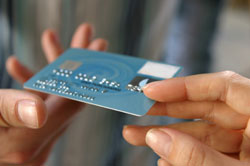6 questions you should ask about merchant accounts
The average consumer and merchant is finding it hard to escape credit and debit cards. Merchants, in particular, need merchant accounts to accept a card transaction. However, do merchants know enough about merchant accounts to make the right choice?

If you own a business, chances are you have read or heard about merchant accounts. There are three types of merchant accounts available for your business. In addition, there are fees and standards that apply for each of them. Here are the questions you need to ask when looking into a merchant account:
What is a merchant account?
Just because you're a merchant with a banking account in your company name and an EIN number doesn't mean you have a merchant account. Merchant accounts provide credit card processing in addition to check processing for merchants. But the main purpose for having a merchant account is to have the resources available to process credit and debit card transactions.
Is a merchant account necessary for my business?
If you sell goods and/or services, chances are you will need a merchant account. More specifically, if you plan to accept credit and debit cards as a form of payment, then you'll definitely need a merchant account. Merchant accounts aren't necessary if you plan on operating as a cash-only business. However, bear in mind that more and more people tend to carry less cash on them and prefer to pay with plastic, making a merchant account a near-necessity for today's merchant.
What types of merchant accounts exist?
There are three basic types of merchant accounts that fulfill the payment processing needs of virtually any business.
- Retail account -- Retail merchant accounts are geared specifically toward transactions in which the card is physically present. This is typically grocery, department stores, restaurants, hotels and any merchant where the customer physically has to go into the store and present their card for payment.
- MOTO account -- Mail order/telephone order, or MOTO, accounts allow you to accept credit and debit card payments for mail order and telephone order transactions. Merchants who do business via catalogs need these types of accounts to accept credit and debt card payments.
- Internet accounts -- With online sales increasing each year, even with traditional retail merchants such as restaurants, the need is increasing for Internet merchant accounts.
Which is best for my business?
Determine what your needs are. If you will just operate a storefront business with a large percentage of walk-in customers who will pay via credit or debit card, then a retail account may best suit you.
If you operate a business solely off of catalog sales, then a MOTO account is ideal for your needs. The fees for this type of merchant account are higher. For Internet sales, transaction fees are higher than retail accounts, but the ease of making a transaction and the client base is greater, making fees less of an issue.
Is my business limited to just one type of transaction?
Your business can have all three types of merchant accounts. For example, pizza take-out businesses, which historically were face-to-face, now offer MOTO and Internet credit and debit card ordering.
Where can I open a merchant account?
Most banks offer merchant account services. A bank that offers such services is called an acquiring bank. Opening a merchant account with the same bank your business normally banks with can offer more ease and easy accounting for your records. If you have more than one type of account with a bank, certain fees associated with your different accounts may be waived. There are also independent card processors that offer the same service credit and debit card processing that acquiring banks offer, as well as check processing.
Published: May 5,2025








 Print
Print  Email
Email 